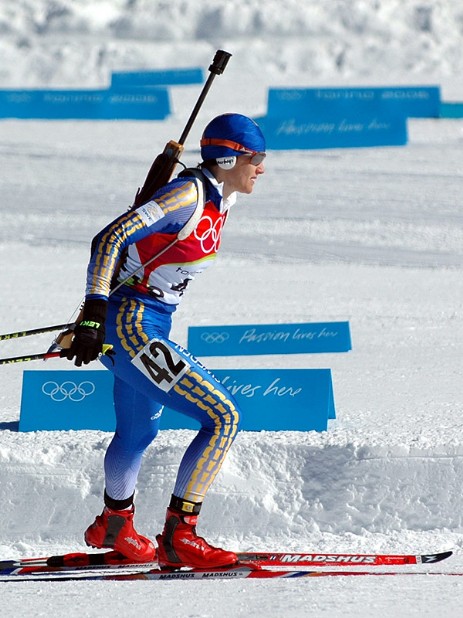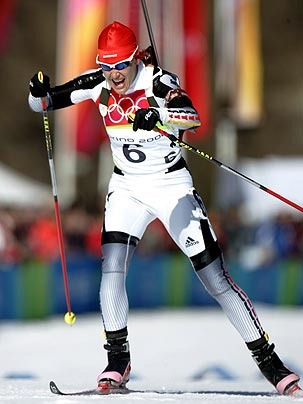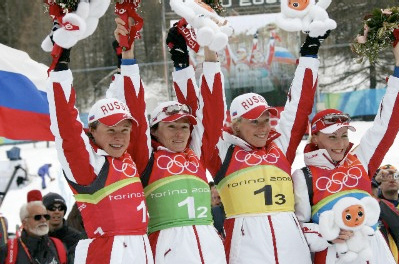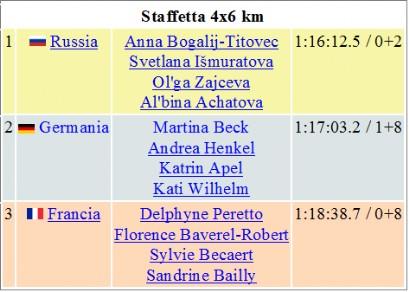Biathlon
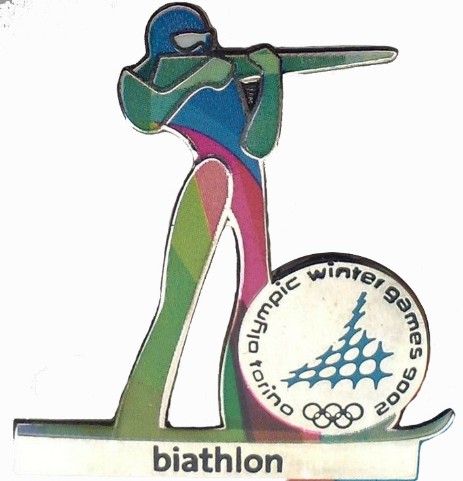

Fucile sulla spalla, a caccia di medaglie.
La resistenza fisica di un atleta che deve coprire 20 km di sci da fondo, la fredda precisione di un tiratore che deve colpire cinque bersagli, la ferma volontà di un campione che deve superare molti concorrenti, tutti ben addestrati
È Michael Greis l'uomo simbolo del dominio tedesco nel biathlon a Torino (ben 11 medaglie, 6 dalle donne, seguono Russia e Francia con 2 ori a testa): il ventinovenne bavarese contribuisce al successo della staffetta e vince anche la 20 km individuale e la 15 km con partenza in linea, lasciando all'asso norvegese Ole Einar Bjoerndalen un argento e un bronzo. Bjoerndalen che puntava a vincere in tre Olimpiadi consecutive ed è invece il simbolo di una Norvegia senza medaglie d'oro, dimostra cosa significhi lo spirito dei Giochi: "Mi ha battuto uno dei rivali più forti. Non ho rimpianti, è stato Greis a superarsi". Ma il biathlon vede anche la squalifica della russa Olga Pyleva, privata dell'argento nella 15 km, perché non sfuggita ai severi controlli antidoping. Nel biathlon ai XX Giochi olimpici invernali, vennero assegnate medaglie in dieci specialità. Le gare si sono svolte dall'11 al 25 febbraio sulle piste di Cesana-San Sicario.
Michael Greis is the symbol of Germany's biathlon dominance in Torino. The Germans took home a total of 11 medals (six were women's), well ahead of nearest rivals Russia and France who managed just two golds apiece. The 29-year-old Greis contributed in no uncertain terms to Germany's success in the relay and won both the 20 km individual event and the 15 km mass start. The Bavarian's prowess, in fact, meant that Norwegian champion Ole Einar Bjoerndalen had to settle for a silver and a bronze. Bjoerndalen, who had his heart set on wins at three consecutive Games, unfortunately went home, like the rest of the Norwegians, with no gold to his name. However, he did prove that he really understands the true spirit of the Games: "I was beaten by one of my strongest rivals. I've no regrets. Greis outdid himself" he remarked. On a sad note, Russian athlete Olga Pyleva lost her 15 km silver after faiIing a drug test.
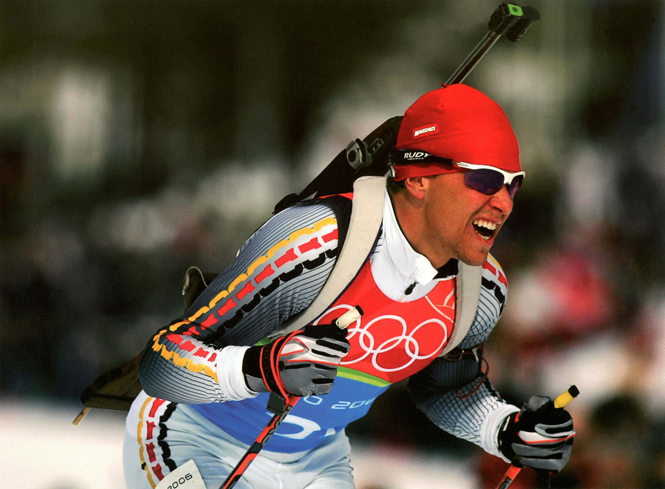
The men's biathlon event at Torino 2006 was dominated by Michael Greis of Germany (seen here in the 4x7.5 km), who won three gold medals
La 20 km individuale è la disciplina più lunga e dura tra le specialità del biathlon e si è svolta il primo giorno di gara dell'Olimpiade. La vittoria è andata a Michael Greis (Germania Germania) che ha preceduto Ole Einar Bjørndalen (Norvegia Norvegia) per soli 16 secondi, dopo che questi aveva quasi compromesso la sua gara a causa di alcuni errori ai primi poligoni, poi recuperati con la prestazione sciistica. Il terzo gradino del podio è andato a Halvard Hanevold. Greis si è poi ripetuto nella 15 Km in linea, battendo il polacco Sikora e il norvegese Bjørndalen.


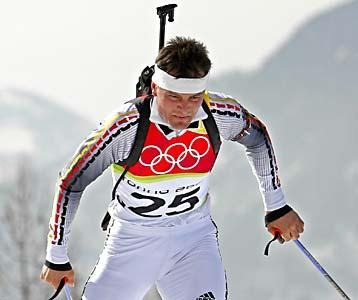
La 10 km sprint vede la seconda affermazione tedesca alle olimpiadi di Torino 2006 con la vittoria di Sven Fischer (Germania Germania), detto Lo squalo grazie alla prova al poligono senza errori. Il tedesco ha preceduto due atleti norvegesi: Halvard Hanevold e Frode Andresen, quest'ultimo molto abile sugli sci. Al tedesco, però, non è riuscita l'impresa della doppietta come al suo connazionale Greis e nella 12,5 Km ad inseguimento si è dovuto accontentare del bronzo, preceduto dal francese Defrasne e dal norvegese Bjørndalen.


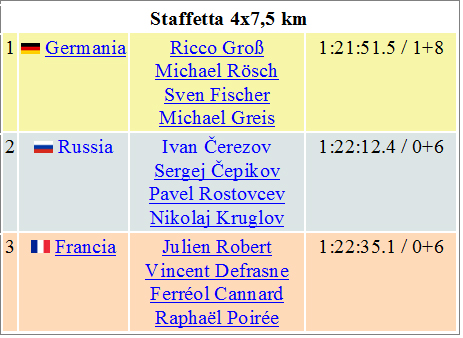


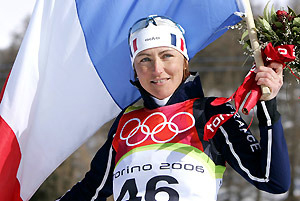
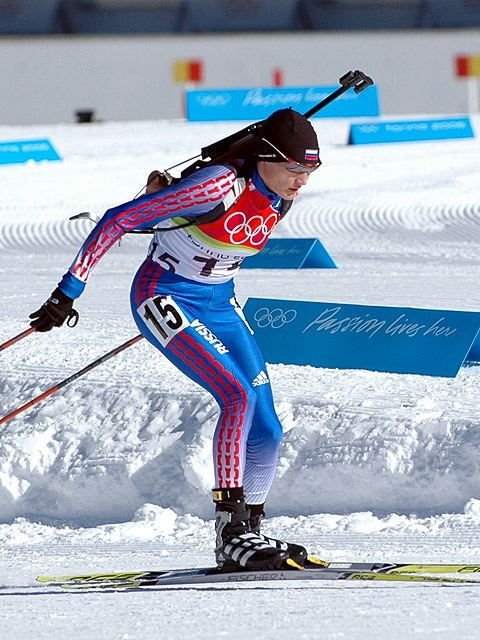
15 km individuale femminile - La vittoria è andata alla russa Svetlana Išmuratova, nota per la precedente lunga serie di podi senza alcuna vittoria. La tripletta russa è stata scongiurata da Martina Beck (Germania Germania), giunta terza dietro a Ol'ga Medvedceva. Quest'ultima dopo la gara è stata squalificata per doping e privata della medaglia d'argento che è andata alla tedesca Beck, mentre il bronzo è stato assegnato alla quarta, poi terza, Al'bina achatova.
